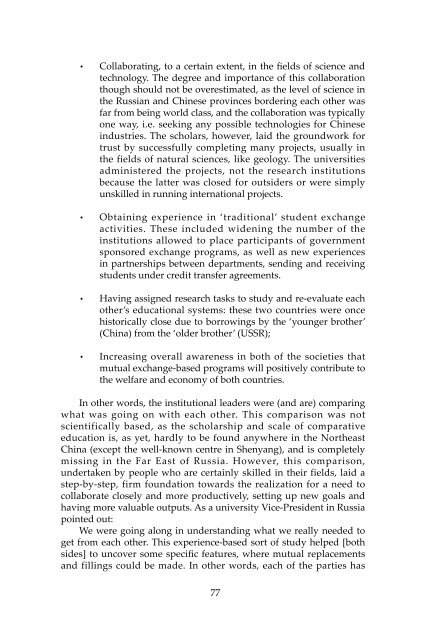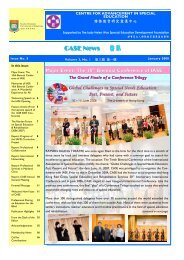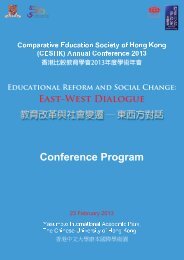Comparative Education Bulletin - Faculty of Education - The ...
Comparative Education Bulletin - Faculty of Education - The ...
Comparative Education Bulletin - Faculty of Education - The ...
Create successful ePaper yourself
Turn your PDF publications into a flip-book with our unique Google optimized e-Paper software.
•<br />
•<br />
•<br />
•<br />
Collaborating, to a certain extent, in the fields <strong>of</strong> science and<br />
technology. <strong>The</strong> degree and importance <strong>of</strong> this collaboration<br />
though should not be overestimated, as the level <strong>of</strong> science in<br />
the Russian and Chinese provinces bordering each other was<br />
far from being world class, and the collaboration was typically<br />
one way, i.e. seeking any possible technologies for Chinese<br />
industries. <strong>The</strong> scholars, however, laid the groundwork for<br />
trust by successfully completing many projects, usually in<br />
the fields <strong>of</strong> natural sciences, like geology. <strong>The</strong> universities<br />
administered the projects, not the research institutions<br />
because the latter was closed for outsiders or were simply<br />
unskilled in running international projects.<br />
Obtaining experience in ‘traditional’ student exchange<br />
activities. <strong>The</strong>se included widening the number <strong>of</strong> the<br />
institutions allowed to place participants <strong>of</strong> government<br />
sponsored exchange programs, as well as new experiences<br />
in partnerships between departments, sending and receiving<br />
students under credit transfer agreements.<br />
Having assigned research tasks to study and re-evaluate each<br />
other’s educational systems: these two countries were once<br />
historically close due to borrowings by the ‘younger brother’<br />
(China) from the ‘older brother’ (USSR);<br />
Increasing overall awareness in both <strong>of</strong> the societies that<br />
mutual exchange-based programs will positively contribute to<br />
the welfare and economy <strong>of</strong> both countries.<br />
In other words, the institutional leaders were (and are) comparing<br />
what was going on with each other. This comparison was not<br />
scientifically based, as the scholarship and scale <strong>of</strong> comparative<br />
education is, as yet, hardly to be found anywhere in the Northeast<br />
China (except the well-known centre in Shenyang), and is completely<br />
missing in the Far East <strong>of</strong> Russia. However, this comparison,<br />
undertaken by people who are certainly skilled in their fields, laid a<br />
step-by-step, firm foundation towards the realization for a need to<br />
collaborate closely and more productively, setting up new goals and<br />
having more valuable outputs. As a university Vice-President in Russia<br />
pointed out:<br />
We were going along in understanding what we really needed to<br />
get from each other. This experience-based sort <strong>of</strong> study helped [both<br />
sides] to uncover some specific features, where mutual replacements<br />
and fillings could be made. In other words, each <strong>of</strong> the parties has<br />
77
















